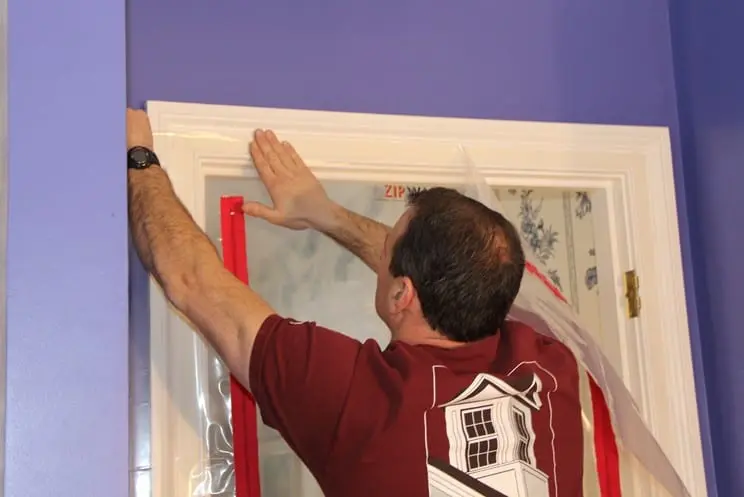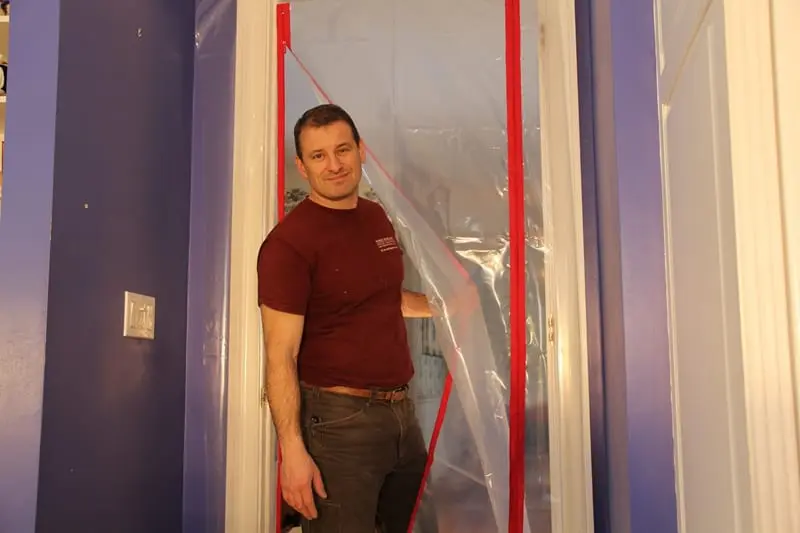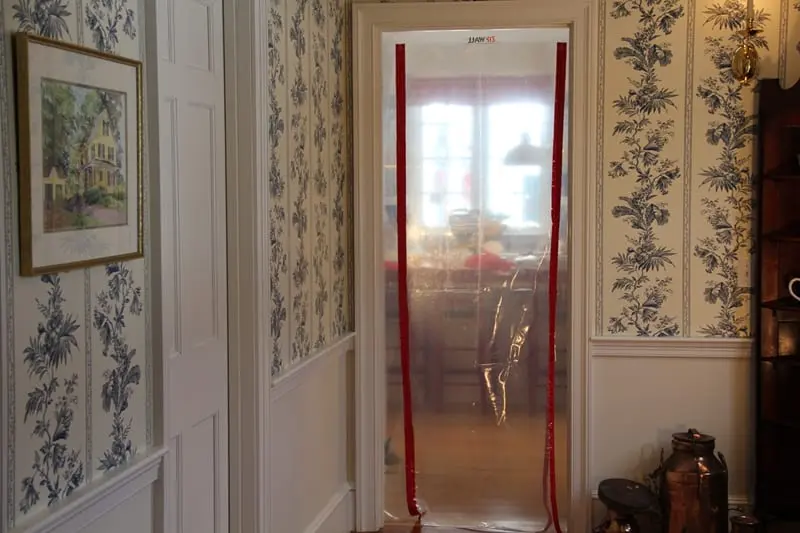As a remodeling contractor, I learned early on that containing remodeling dust and keeping that dust out of the non-remodeled portion of your client’s home is often more important than the quality of your work. It’s a fact that construction transports fine dust particles into parts of your home that are not being worked on. This ZipWall ZipDoor Kit review was the result of many years of trial and error.
Editor’s Note: This review first published in the Pro Tool Reviews print magazine on May 24, 2013.
ZipWall ZipDoor Kit for Preventing Unintended Consequences
There is nothing worse than having your client tell you they want you to pay for a professional to remove the plaster dust from the inside of their baby grand piano.
Let’s face it—we all know it’s a pain to clean. Remodeling dust can also result in health concerns. Why not take precautions to avoid it? Many homeowners, kids with asthma, and seniors have COPD. As a result, I always ask. That way, I can tell them how I contain dust with tools like the ZipWall ZipDoor Kit. This makes for a great way to add value when bidding on a project.
The remodeling dust problem is even compounded by today’s recent EPA lead dust containment regulations. If you live in a pre-1978 house, the dust created during remodeling from lead-based paint is another of your worries. EPA regulations, in part, control just how you approach your remodel.
Dust Containment the Old Way
For years and years, I did odd things to control remodeling dust at a framed opening on a job site. I would attach a drop cloth to the top door trim with finish nails or tape-up plastic over the doorway. Then I’d rely on my dust extractor to pull out the dust from any power tools I used. The problem with these methods is they never really worked that well. Dust always found its way past these barriers. Over the years I have developed strategies and researched the BEST methods to control remodeling dust. One part of my strategy is to use several dust containment products from a company called ZipWall.
The ZipWall ZipDoor Kit is an ingenious dust containment system. It lets you easily and quickly build plastic dust containment walls. Prior to using the ZipDoor kit, I would literally have to build my own dust barrier wall with 2x4s, screws, and plastic. Not only is this a slow process (and an expensive one), but it can also cause floor and ceiling damage.
ZipWall ZipDoor Kit Seals Out Dust
ZipWall used to (and still does) sell zippers that tape right onto plastic. You then cut the plastic and have an instant zippered doorway. For the past few years, I’ve been taping plastic over doorways and just adding a ZipWall zipper to make my own access door.
These zippers are still very useful when you need to access an area through a long run of dust-containment plastic sheeting. However, using these add-on zippers involves taping and cutting plastic. I always seem to find a way to jam the zipper.
Zippers on 4 Mil Plastic Sheathing
Recently, the company came out with a zippered doorway product appropriately called the ZipWall ZipDoor kit. It is an inexpensive dust control solution made from 4 mil plastic sheeting. It also includes two pre-installed heavy-duty zippers. They’re not as durable as the zippers on a Veto Pro Pac MC tool bag, but they’ll last for the duration of your job. It’s also available in two sizes, including 3′ x 7′ and a commercial model measuring 4′ x 8′. The latter commercial kit is also flame retardant.
The two zippers can be opened and held up by a couple of wire hooks (provided). This allows easy access to the dust containment area, which is useful when bringing materials or tools into the area that require some extra space. A roll of double-sided tape (also provided) is used to position the ZipDoor onto the doorway trim. The two-sided tape lets you easily mount and reposition the door as needed to get it just right.
The plastic sheeting sticks onto the double-sided tape in the door opening to make a dust-proof sealed door in just a couple of minutes. ZipWall designed the Zip Door kit to zip and unzip as needed for regular entry and exit into the work zone. I like that the ZipDoor uses clear plastic poly sheeting. This works well for two reasons. First, it provides job site safety—the clear plastic lets you see through the door. Second, the clear plastic lets light travel into the work area to help you see what you’re doing.
The Zip Door Kit Saves Me Time and Money
This Zip Wall ZipDoor kit took me just a few minutes to install, and it’s ideal for jobs where I need to create a dust barrier and sealed access doorway. One side of the ZipWall tape is like a traditional painter’s tape. It’s sticky enough to hold, but it doesn’t damage trim paint. The other side holds the plastic sheeting securely. It also lets you reposition the ZipDoor for up to an hour before fully bonding to the plastic—a feature I found invaluable. One person can install it in under a minute—reducing labor costs. Also, if you use care when removing it, you can use it again and again. So far, I’ve re-used my ZipDoor Kit three times.
I found the ZipWall ZipDoor Kit to be invaluable on residential jobs like kitchen and bath remodeling and where a renovation may disturb lead paint. (Make sure you have your lead-safe certification.)
Overall Impression of the ZipDoor
As I said at the beginning of the article, there is nothing worse than having your client tell you plaster dust made its way into their baby grand piano or coated and possibly damaged their one-of-a-kind, circa 1600 tapestry.
In the past two weeks, I’ve used the ZipWall ZipDoor kit three times and found it super easy to install and break down. It worked well containing the dust we created. The double zipper door and door hanging hooks also allowed fast and easy access for materials and tools to the job site area.
The pre-installed zippers worked great. They attach securely to the plastic sheeting and seem well-made. I now keep three Zip Door kits and extra tape in my dust containment tool bag. I consider the ZipWall Zip Door kit cheap insurance and part of my dust control strategy. If you don’t plan for and think about containing dust, you will have unhappy clients.
Remember that time spent at the beginning of the project is time and money saved later by avoiding an unnecessary (and possibly embarrassing) clean-up.
For more information, check out ZipWall.com.
Special thanks to Rob Robillard from AConcordCarpenter for putting together this review which first published in the Pro Tool Reviews print magazine.














